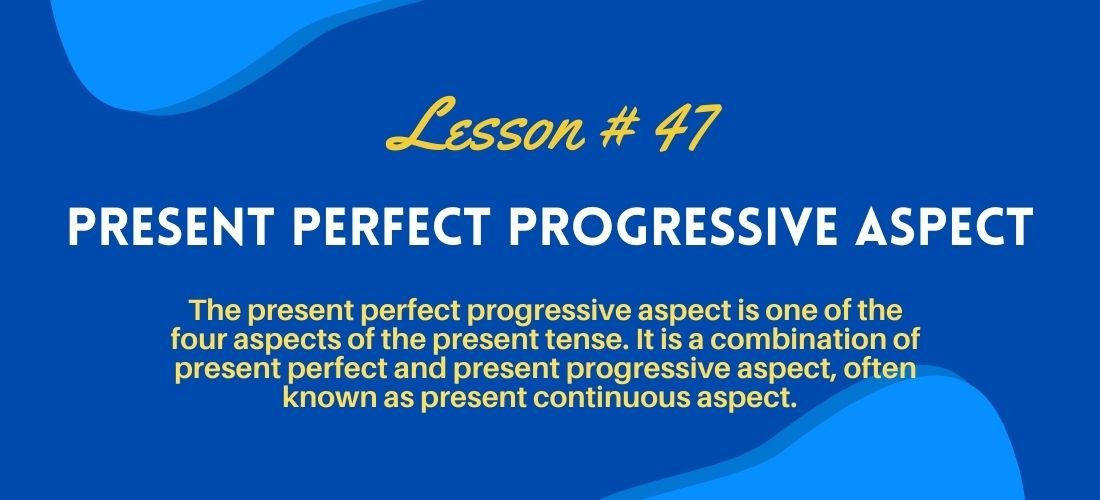Present Perfect Progressive Aspect

Present Perfect Progressive Aspect
The present perfect progressive aspect is one of the four aspects of the present tense. It is a combination of present perfect and present progressive aspect , often known as present continuous aspect.
Present perfect continuous/progressive aspect is used to express continuous actions that started at some time in the past and are still going on in the present time. But the action is of limited time duration.
This aspect of the present tense cannot contain adverbial phrases for a specific time in the past or future, such as yesterday, tomorrow, last week, etc. but it can contain phrases for unspecific time in the past or present such as today, just now, now, etc.
You don’t need to get confused between the present perfect aspect and the present perfect progressive aspect.
Present perfect aspect is used to describe actions that happened in the past and have some effects on the present time
Example: It has rained today. (It is no more raining, but the water of rain is still there)
Present perfect progressive aspects show such actions that started in the past and are still happening.
Example: It has been raining today since morning.
Formation
The present perfect progressive structure is a blend of present perfect and present continuous aspect. It is formed by the auxiliary verb (Have/ Has) + been and present participle form of the verb. (base form of the verb + -ing.)
Positive/ affirmative sentences
| Subject | Auxiliary verb | Verb | Object | Punctuation |
| Subject | Have / Has + been | Present participle | Object (optional) | Period (.) |
Example:
- I have been reading the book since morning.
- You have been eating snacks for two hours.
- She has been sleeping.
- He has been finishing his assignment.
- They have been waiting for her for 40 minutes.
Negative sentences
| Subject | Auxiliary verb +not | Verb | Object | Punctuation |
| Subject | Have / Has + not + been | Present participle | Object (optional) | Period (.) |
Example:
- I have not been reading books since morning.
- You have not been eating snacks for two hours.
- She has not been sleeping.
- He has not been finishing his assignment.
- They have not been waiting for her for 40 minutes.
Interrogative sentences
Auxiliary verb | Subject | Been | Verb | Object | Punctuation |
Have / Has | Subject | Been | Present participle | Object (optional) | Question mark (?) |
Example:
- Have I been reading the book since morning?
- Have you been eating snacks for two hours?
- Has she been sleeping?
- Has he been finishing his assignment?
- Have they been waiting for her for 40 minutes?
Uses of Present Perfect Progressive Aspect
There are two primary uses of the present perfect progressive aspect.
- Action beginning in the Past and are still in progress.
The present perfect progressive aspect's important use is to describe actions that started in the past and are still happening. In such sentences, we emphasize the duration of the action ( two weeks, two hours, 1999, last week), not the result. For and since are used in such sentences.
Example:
- I have been exercising for two hours.
- We have been washing clothes for 1 hour.
- They have been sleeping for since morning.
- He has been living here since 1999.
- She has been talking for 3 hours.
- Have you been working as a nurse since 2008?
Finished action influencing the present.
The second vital use of the present perfect progressive aspect is to describe those actions that started in the past and completed recently, but their consequences or results can be seen, felt, or heard in the present time. We don’t mention duration in such sentences.
Example:
- I am sleepy; I have been working all day.
- Why is that glass dirty? Haven’t you been cleaning it?
- She has been watching too many movies.
- You are sweating. Have you been cleaning the backyard?
- Where were you? I have been baking cakes.
- She is sleeping; she has been dancing all night.
Use of since and for in the Present Perfect Progressive Aspect
You must have observed that that use of since and for is frequent and common in the present perfect progressive aspect.
For is used to talk about a period of time:
Three hours, six days, eight years, a decade.
Since is used to talk about a point in time: morning, Monday, 9’o clock, February, Friday, 2005.
Exception: you have to use ‘for’ for ‘ages’; you can’t use ‘since’ for ‘ages.
Conclusion:
The present perfect progressive aspect is often used to express actions that caused other actions in the past. After reading this lesson, you can now easily differentiate between the present perfect and present perfect progressive aspects. You need to remember two things:
1. There’s a special increment of ‘been’ in the present perfect progressive aspect.
2. present participle form of the main verb is used in this aspect.
Whenever you are learning English, you must spend some time learning English because you need to express when something happens while communicating.


